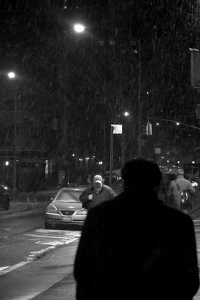
Race and class are Boston's hidden costs of living
Nashville faces identity crisis
"The turnaround came when I started to realize this was my environment and I could have an effect on what was going on"Nashville's approach toward diversity has been under scrutiny lately. Nissan employees in California are considering moving to the automobile giant's future headquarters in a Nashville suburb, and a survey by Nissan's relocation agency showed that the employees' number-one concern is diversity. Assuming Nashville is able to attract these and other diversity-seeking newcomers, will the city be able to keep them in the long run? Will diversity itself be the deciding factor, or will the subtleties of Middle Tennessee sentiment be high on the mind? The issue may ultimately be whether Nashville is friendly enough to be a welcoming city.
As the Boston Globe reports in this article, Boston is finding out that the perception of an unwelcoming racial atmosphere drives minorities away.
"Within a year of moving to the Boston area toward the end of 2000, Raymond Johnson began lobbying his wife, Idella, to leave a region whose coldness -- in every sense of that word -- had baffled, frustrated, and ultimately alienated him."
"..in the summer of 2004, they packed up and moved to this small town just east of Raleigh. They have not looked back. The schools are solid, the weather is balmy, the neighbors are friendly, and housing prices are a fraction of what they are in Massachusetts. But for this African-American couple, there was a hidden cost of living in the Boston area that had nothing to do with housing or taxes or insurance."
"That hidden cost had to do with Boston's most intractable problem: race. And it was further inflamed by Boston's enduring obsession: class. Those factors coalesced into a tipping point for the Johnsons. Seeking a racially mixed environment for their children that, in Idella's words, 'looked like the world,' they faced the realities of a region divided into two worlds: one black, one white."
"Raymond and Idella Johnson embody a warning contained in an April report by the Civil Rights Project at Harvard University: 'Perceptions of racial discrimination can affect the decisions of talented minorities within the region to stay or to leave.'"
The Boston.com story is one of a series called How We Live Here, which follows minority individuals and families in Boston who have been frustrated with racial unfriendliness in the city.
Tiffany Dufu, a 31-year-old African-American professional who recently moved to Boston "was flat-out stunned when a list of 'The 100 People Who Run This Town' in last month's issue of Boston magazine contained only one black person. (It was the Rev. Eugene Rivers, listed at No. 97.) 'I'm looking at the list and I'm going, come on, you've got to be kidding me," says Dufu. 'Either this can't be true, or this is true and this place is in big trouble. How can the civic leadership tolerate that?"
"...as an African-American woman, Dufu is also troubled by some of what she has seen and heard in the Boston area. So troubled, in fact, that she is far from sure she will stay here when she and her husband, Kojo, start a family. 'I'll be really candid and say that as long as it was just Kojo and I, I'd be fine with it,' she says. 'But I have concerns about raising my black children in Boston. This would be a tough place for me to have a family.'"
Not all minorities are leaving Boston, of course. David Blanding, a 20-year-old African-American Boston University student, decided to channel his disappointment over the the university's lack of diversity into renewed investment into the community:
"'The turnaround came when I started to realize this was my environment and I could have an effect on what was going on. Once I gained that ownership, I was able to be more open and do more things,' Blanding says. 'This is my school. I'm a shareholder in this large corporation. I might as well do something meaningful with it. Since then I've been much more involved on campus. Out in Boston as well. Making this my city.'"
"'Martin Luther King once said a true leader has to be not a searcher for consensus but a molder of consensus,' he says. 'It's not about waiting for people to be ready. It's about making people realize that they're ready.'"


 Photo by Roey Ahram. Licensed under Creative Commons.
Photo by Roey Ahram. Licensed under Creative Commons.

No comments:
Post a Comment